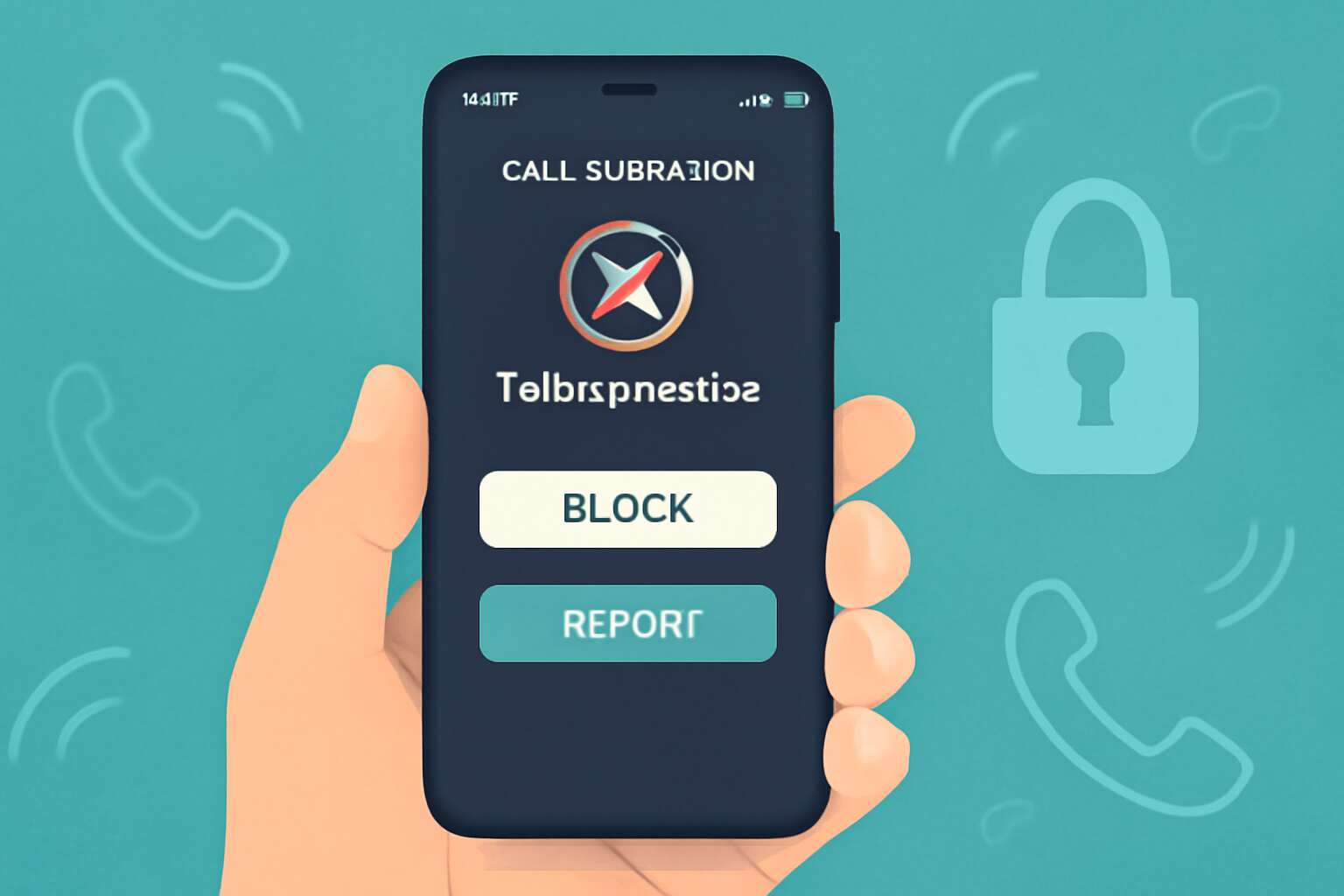Understanding Telemarketing Calls and Their Impact
Types of Telemarketing Calls – Distinguishing between legitimate and scam calls
Telemarketing calls are a love-hate relationship—sometimes a helpful reminder, other times an intrusive nuisance that makes your phone feel like it’s got a vendetta. Interestingly, a staggering 75% of South Africans report receiving unwanted telemarketing calls, highlighting just how pervasive this annoyance has become. Understanding the different types of telemarketing calls is crucial, especially if you want to know how to report telemarketing calls effectively. It’s not always clear-cut; some calls are legitimate, while others are outright scams designed to drain your wallet faster than you can say “blocked number.”
Legitimate telemarketing calls often come from reputable companies conducting surveys, promotions, or customer service follow-ups. Conversely, scam calls are crafted to deceive, often pretending to be government officials or bank representatives, with malicious intent hidden behind a friendly voice. Recognizing the difference is key to knowing how to report telemarketing calls. If a call feels suspicious, it’s best to err on the side of caution and report it through the appropriate channels. This not only helps protect your personal information but also contributes to a broader effort to curb these intrusive practices.
Why Reporting Telemarketing Calls Matters – Protecting privacy and preventing scams
Telemarketing calls have become an unavoidable part of modern life, with a staggering 75% of South Africans reporting unwanted interruptions. These calls can range from harmless promotional offers to sophisticated scams designed to exploit unsuspecting individuals. Understanding how to report telemarketing calls is not just about silencing your phone; it’s a vital step in safeguarding your privacy and personal information. When you recognize the signs of suspicious calls, you’re better equipped to take action and protect yourself from potential threats.
Reporting these calls promptly helps regulatory authorities identify patterns and target persistent offenders. It also discourages illegal or aggressive telemarketing practices, making the landscape safer for everyone. Whether it’s a scam pretending to be from a bank or a persistent telemarketing company, knowing how to report telemarketing calls ensures that your voice contributes to a broader effort to curb intrusive and malicious practices. By taking the time to report, you’re not only defending your own privacy but also helping to create a more secure communication environment for all South Africans.
Legal Regulations on Telemarketing – Overview of laws like TCPA and Do Not Call Registry
Understanding telemarketing calls and their impact is akin to deciphering a cryptic language that often leaves us bewildered. These calls, whether they bring offers or threats, ripple through our daily lives like an uninvited storm—sometimes harmless, sometimes malicious. Recognizing the importance of knowing how to report telemarketing calls is crucial in this modern age where privacy is a fragile treasure. It’s not just about silencing the ringing; it’s about reclaiming control over your personal space.
Legal regulations serve as the silent guardians of our communication rights. In South Africa, laws such as the TCPA (Telephone Consumer Protection Act) and the Do Not Call Registry act as shields, designed to curb invasive telemarketing practices. These statutes establish clear boundaries, ensuring that consumers are protected from relentless interruptions and fraudulent schemes. Understanding how to report telemarketing calls within this legal framework empowers individuals to stand against those who violate these protections.
- Register your number on the Do Not Call Registry to limit unsolicited calls.
- Keep records of suspicious or aggressive telemarketing calls for evidence.
- Contact regulatory authorities promptly if calls persist despite your registration.
By navigating the labyrinth of regulations and knowing how to report telemarketing calls, South Africans can transform their silence into a powerful voice. Every report is a step towards a safer, more respectful communication environment—one where privacy is not a privilege but a right fiercely defended.
Preparing to Report Unwanted Telemarketing Calls
Gathering Call Details – Recording date, time, caller ID, and duration
Gathering precise call details transforms a mundane nuisance into a compelling case for action. When learning how to report telemarketing calls, the first step is to meticulously record the essential information—think of it as collecting evidence in a quiet courtroom. The date and time of the call offer context, revealing patterns or suspicious timing that might suggest a scam. Caller ID, often a fleeting illusion, can sometimes be spoofed, but noting it down remains invaluable. The call duration, surprisingly overlooked by many, can indicate whether the caller is hurriedly pushing through a script or engaging in persistent pestering.
To streamline this process, consider keeping a dedicated log or using a smartphone note. If you want to elevate your report, an organized list can be a game-changer:
- Date and time of call
- Caller ID information
- Duration of the call
- Summary of the conversation or reason for call
Knowing how to report telemarketing calls with detailed accuracy ensures your complaint stands a better chance of making an impact—after all, a well-documented case is half the battle won in the fight against unwelcome interruptions in South Africa’s increasingly vigilant telecommunication landscape.
Documenting Your Experience – Notes on conversation content and caller behavior
When it comes to how to report telemarketing calls effectively, documenting your experience is crucial. These calls often come with a strange mix of charm and suspicion—like a bad date you can’t quite shake off. To build a compelling case, note down the conversation content and caller behavior with meticulous detail. Did the caller press for personal information? Were they overly persistent or evasive? Such nuances can be the difference between a dismissive complaint and a serious legal challenge.
Keeping track of these details isn’t just about jotting down a few notes. An organized record can reveal patterns—perhaps calls come at odd hours or from suspicious caller IDs. For a thorough report, consider creating a simple log with key points such as:
- Specific statements or pitches used by the caller
- Any aggressive or suspicious behavior
- Responses or refusals from your side
Knowing how to report telemarketing calls with detailed, honest notes not only amplifies your voice but also enhances the likelihood of your complaint making a meaningful impact. Remember, every well-documented case brings us a step closer to a quieter, scam-free South Africa. After all, when faced with relentless telemarketers, the best defense is a well-documented offense!
Collecting Evidence – Saving voicemails, screenshots, and call logs
Gathering compelling evidence is the cornerstone of understanding how to report telemarketing calls effectively. In a landscape saturated with persistent callers, a well-organized collection of evidence transforms frustration into actionable insight. Voicemails, screenshots, and detailed call logs serve as the digital breadcrumbs that can reveal patterns and expose illegitimate practices.
To maximize the impact of your report, consider the following:
- Save voicemails that contain sales pitches or suspicious language.
- Capture screenshots of caller IDs or suspicious messages.
- Maintain a call log with date, time, duration, and caller information.
These pieces of evidence build a robust narrative, illustrating the caller’s tactics and persistence. When you know how to report telemarketing calls with thorough documentation, your complaint becomes a formidable tool—helping to curb unwanted calls and protect others from scams. Remember, each piece of evidence is a brick in the fortress against relentless telemarketing nuisance!
How to Report Telemarketing Calls to Authorities
Reporting to the Do Not Call Registry – Step-by-step process and benefits
When it comes to how to report telemarketing calls, many South Africans are surprised to learn that their complaints can actually make a difference. The process is straightforward and surprisingly empowering—think of it as giving a voice to your silent phone. First, visit the official website of the National Consumer Commission or your local telecommunications regulator. These authorities are the gatekeepers, ready to address your grievances with a level of professionalism that telemarketers often lack.
Next, gather all relevant details—call date, time, caller ID, and duration—before filing your report. You can do this through an online form or by calling their dedicated hotline. Some platforms even allow you to upload voicemails or screenshots, making the evidence process as easy as snapping a selfie. By reporting telemarketing calls, you help authorities identify persistent offenders and enforce stricter regulations that protect consumers from intrusive marketing tactics. Remember, knowing how to report telemarketing calls isn’t just about stopping one nuisance; it’s about reclaiming your peace of mind.
Filing Complaints with the FTC – Using online forms and reporting tools
In a world inundated with persistent telemarketing calls, knowing how to report telemarketing calls effectively can be a game-changer. Many South Africans find themselves overwhelmed, but the truth is, your complaint can trigger meaningful change. Reporting these calls via the right channels ensures your voice is heard and helps curb intrusive marketing practices.
One of the most straightforward ways to report telemarketing calls is through online forms provided by authorities like the National Consumer Commission or the telecom regulator. These platforms are designed to streamline your complaint, making it easy and accessible. When you fill out the form, be sure to include essential details such as the call date, time, caller ID, and the duration of the call. This information is vital for authorities to identify and act against repeat offenders.
Using online reporting tools, you can upload voicemails, screenshots, or call logs, which serve as compelling evidence. This process not only helps enforce existing regulations but also discourages telemarketers from engaging in illegal or aggressive tactics. Remember, knowing how to report telemarketing calls is more than a mere formality; it’s a powerful way to reclaim control over your privacy and peace of mind.
Reporting to State Authorities – Contact information and procedures for local agencies
When it comes to safeguarding our privacy, understanding how to report telemarketing calls to local authorities can make all the difference. In South Africa, multiple agencies are dedicated to protecting consumers from intrusive marketing practices and scam calls. Knowing the correct contact points and procedures ensures your complaint reaches the right hands, amplifying your voice in the fight against relentless telemarketers.
The primary step is to identify the appropriate agency for your region. For example, the National Consumer Commission and the Independent Communications Authority of South Africa (ICASA) are key players in this arena. You can contact them via their official websites or designated helplines. Many agencies offer straightforward online forms where you can submit detailed reports about each call. Be prepared to include specifics such as the date, time, caller ID, and call duration—these details are instrumental in tracking down offenders.
In some cases, authorities may require supporting evidence. This can include voicemails, screenshots of call logs, or call recordings. Uploading such documentation along with your report enhances its credibility and effectiveness. Moreover, some agencies provide step-by-step instructions on how to report telemarketing calls, guiding consumers through the process seamlessly. Whether through web-based portals or direct contact, knowing how to report telemarketing calls empowers you to protect your privacy and helps combat illegal marketing tactics.
Using Mobile and Phone Carrier Reporting Options
Reporting via Mobile Apps – Apps and services for blocking and reporting spam calls
In a world where unsolicited telemarketing calls have become an unwelcome daily nuisance, knowing how to report telemarketing calls effectively can bring a much-needed sense of relief. Many mobile carriers now offer built-in tools or dedicated apps designed to combat this relentless barrage of spam. These services often allow users to quickly block suspicious numbers or report unwanted calls directly from their mobile devices, streamlining the process and reducing frustration.
Reporting via mobile apps is straightforward and empowering. Apps such as Truecaller, Hiya, or your carrier’s proprietary platform enable you to flag spam calls with just a few taps. Some carriers also offer automated reporting features that analyze call patterns and alert authorities if the number appears to be part of a larger scam network. This proactive approach not only helps protect individual privacy but also contributes to broader efforts to curb telemarketing abuse.
Understanding how to report telemarketing calls through your mobile carrier’s reporting options can be a game-changer. It’s more than just blocking a nuisance—it’s about taking control and helping authorities identify persistent offenders. By consistently utilizing these tools, consumers play a vital role in the fight against intrusive telemarketing practices.
Contacting Your Phone Carrier – How carriers assist in blocking and reporting scams
In South Africa, countless consumers grapple daily with relentless telemarketing calls that invade their peace. Knowing how to report telemarketing calls effectively transforms frustration into empowerment, allowing you to take action against persistent nuisances. Mobile carriers in the region have stepped up by offering sophisticated reporting options, making it easier than ever to combat scam calls. These tools are designed to streamline the process, enabling users to swiftly identify and block unwanted calls, reducing the chaos of unsolicited marketing.
When you contact your phone carrier to report telemarketing calls, you tap into a powerful resource that can aid in tracking down offenders. Many carriers provide dedicated platforms where users can submit call details or flag suspicious numbers. This collaborative effort not only shields your privacy but also bolsters broader efforts to curb scam telemarketing practices across South Africa. With each report, you contribute to a safer, less intrusive telecommunications environment.
Leveraging Call-Blocking Features – Utilizing built-in device features and third-party apps
In South Africa, the relentless surge of telemarketing calls can feel like an invasion of your personal space, disrupting both peace and productivity. Understanding how to report telemarketing calls effectively transforms this frustration into a tool for empowerment. Mobile carriers have integrated advanced call-blocking features and reporting options directly into their platforms, making it easier for consumers to take control. Leveraging these built-in tools not only helps shield your privacy but also contributes to a collective effort to diminish scam telemarketing practices.
Most modern devices offer native call-blocking functionalities that allow you to silence unwanted numbers with just a few taps. For example, smartphones typically have features to block specific callers or filter suspected spam calls automatically. Additionally, third-party apps like Truecaller or Hiya can identify and report scam numbers swiftly, providing a more comprehensive shield against persistent nuisance calls. These apps often include community-driven databases, which help users know how to report telemarketing calls that seem suspicious or intrusive.
- Activate your device’s call-blocking settings—this is often found in the call or security menu of your phone.
- Utilize third-party apps that specialize in spam detection and reporting, ensuring you stay ahead of scam callers.
- Regularly update your app and device software to benefit from the latest security enhancements and call-identification features.
By harnessing these integrated and third-party tools, consumers can proactively diminish the chaos caused by unsolicited telemarketing. Each report sent through these channels not only helps your device block future calls but also feeds into larger industry databases, which assist authorities and carriers in tracking down persistent offenders. Ultimately, knowing how to report telemarketing calls using these features empowers you to reclaim your peace of mind in a digital landscape teeming with potential scams and intrusions.
Avoiding Telemarketing Scams and Protecting Your Privacy
Recognizing Scam Calls – Common tactics and red flags
Every day, countless South Africans find themselves caught in the web of telemarketing scams, often feeling powerless against persistent callers. Understanding how to report telemarketing calls is crucial in safeguarding your privacy and preventing these invasive tactics from spreading further. Recognizing scam calls involves spotting common tactics such as high-pressure pitches, urgent threats, or requests for personal information. These red flags serve as warning signs that the caller might be attempting to exploit your trust or steal your data. Stay vigilant — if something feels off, it probably is.
Protecting your privacy starts with knowing how to report telemarketing calls effectively. Keeping a detailed record of call details—like date, time, and caller ID—can be invaluable when confronting these scammers. Sometimes, a simple screenshot or voicemail recording can make all the difference. By reporting suspicious calls through official channels, such as the Do Not Call Registry or local authorities, you contribute to a collective effort to curb spam and fraud. Remember, your awareness and proactive reporting help create a safer environment for everyone. Together, we can make telemarketing scams a thing of the past!
Best Practices to Reduce Calls – Opt-out, block numbers, and privacy settings
In a world where your phone can be a gateway to both connection and chaos, understanding how to report telemarketing calls is more vital than ever. Every unwanted call chips away at your peace of mind, especially when scammers disguise their intentions with convincing tactics. To protect your privacy, it’s essential to be proactive and familiar with effective methods for reporting these intrusions. When you know how to report telemarketing calls, you’re not just defending yourself—you’re helping to safeguard your community from invasive tactics.
One of the best ways to minimize these disruptions is by leveraging your device’s privacy settings and opting out of unwanted calls. Most smartphones now offer built-in call blocking features that let you filter out persistent telemarketers. Additionally, utilizing third-party call-blocking apps can drastically reduce spam calls—freeing you from the frustration of incessant ringing. These tools are especially valuable for South Africans seeking practical solutions.
- Activate the call-blocking features on your mobile device to halt nuisance calls before they reach you.
- Use reputable apps designed specifically to report and block spam calls, which often include a community-driven database of known scammers.
- Regularly update your privacy settings and opt out of telemarketing lists—knowing how to report telemarketing calls helps you take control of your personal information.
By combining these practices with careful documentation—such as saving voicemails or taking screenshots—you can build a solid case when reporting suspicious calls. Remember, your efforts contribute to a collective stand against invasive telemarketing tactics. Protect your peace, safeguard your privacy, and help create a safer environment for everyone—because every report counts in the fight against these persistent nuisances!
Reporting and Responding Safely – How to handle suspicious calls securely
In the labyrinth of modern communication, safeguarding your privacy requires more than mere vigilance; it demands a strategic approach rooted in knowledge. When faced with suspicious or invasive telemarketing calls, understanding how to report telemarketing calls becomes an essential skill. This act of resistance not only shields your personal sanctuary but also contributes to a collective effort to diminish the prevalence of scam calls plaguing South Africa’s phone lines.
Filing reports is more than an act of frustration—it’s a potent tool to curb predatory tactics. Recognizing common red flags, such as unsolicited offers or pressure tactics, can help you respond with confidence. When you encounter a dubious call, documenting details like the caller ID, time, and conversation content enriches your report, making it more impactful.
A straightforward method involves utilizing mobile apps designed for reporting and blocking spam calls, which often include community databases of known scammers. These tools act as digital guardians, helping you filter out unwanted intrusions before they disturb your peace. Remember, your proactive approach in how to report telemarketing calls not only protects your privacy but fortifies the collective defenses against these persistent nuisances.
Additional Tips for Effective Reporting
Reporting Consistent Offenders – Tracking repeat callers and patterns
In the shadowed corridors of modern communication, some telemarketing calls echo with malicious intent, haunting the quiet spaces of our lives. Knowing how to report telemarketing calls effectively is vital when confronting persistent offenders. Tracking repeat callers and patterns can reveal a dark tapestry of deceit woven through countless clandestine attempts to invade our privacy. By monitoring call frequency, time slots, and caller ID anomalies, you can unmask the subtle signatures of recurring intrusions, giving you the power to respond with precision and authority.
One of the most potent strategies is to maintain a detailed log. Document every encounter—note the date, time, and nature of the conversation. This record becomes an invaluable weapon against those who refuse to heed the law. For example, if a caller repeatedly breaches the Do Not Call Registry, these patterns can be flagged and escalated to relevant authorities. Remember, the key to effective reporting lies in consistency; the more comprehensive your tracking, the stronger your case against telemarketing offenders.
Sharing Information with Your Community – Alerting neighbors and online forums
Sharing information with your community can be a powerful weapon against relentless telemarketing calls. When one neighbor falls prey to a scammer, it’s only fair to shout it from the rooftops—or at least post on the local online forum. Spreading the word about how to report telemarketing calls not only empowers others but also creates a united front against these nuisance callers. After all, a vigilant community is a less inviting playground for persistent offenders.
Consider forming a local watch group or joining existing online forums dedicated to consumer protection. These platforms serve as a hub for sharing call details, suspicious patterns, and effective reporting methods. For example, you might share a quick guide on how to report telemarketing calls to authorities or the Do Not Call Registry. This collective knowledge can turn individual frustrations into a formidable barrier against invasions of privacy.
To streamline this effort, create a simple, shareable checklist:
- Record the caller’s number, date, and time of each call.
- Screenshot any suspicious messages or voicemails.
- Note the caller’s behavior—were they pushy, evasive, or downright rude?
By pooling these insights, your community becomes a well-oiled machine, better equipped to identify repeat offenders and escalate reports effectively. Remember, the more people know how to report telemarketing calls, the less power these nuisance callers have to invade your peace of mind!
Staying Informed on Telemarketing Laws – Keeping up-to-date with regulations and protections
Staying abreast of telemarketing laws is like trying to keep up with the latest dance move—tricky but vital. In South Africa, regulations such as the Consumer Protection Act and the National Consumer Commission’s guidelines are your legal shield. Knowing how to report telemarketing calls effectively hinges on understanding these protections and leveraging them to your advantage. When you’re armed with current legal insights, reporting becomes less of a chore and more of a strategic move against invasive callers.
To ensure your efforts are impactful, keep yourself informed about any updates or amendments to existing laws. This knowledge helps you recognize when a telemarketer crosses the line or flouts regulations. For instance, if a caller continues to ignore the Do Not Call Registry or employs aggressive tactics, you’ll be better equipped to escalate the issue confidently.
One powerful way to stay informed is by subscribing to consumer advocacy newsletters or following official government portals. These sources often provide the latest updates on how to report telemarketing calls, as well as guidance on legal recourse. Remember, an educated consumer is a formidable opponent against persistent nuisance calls!




0 Comments